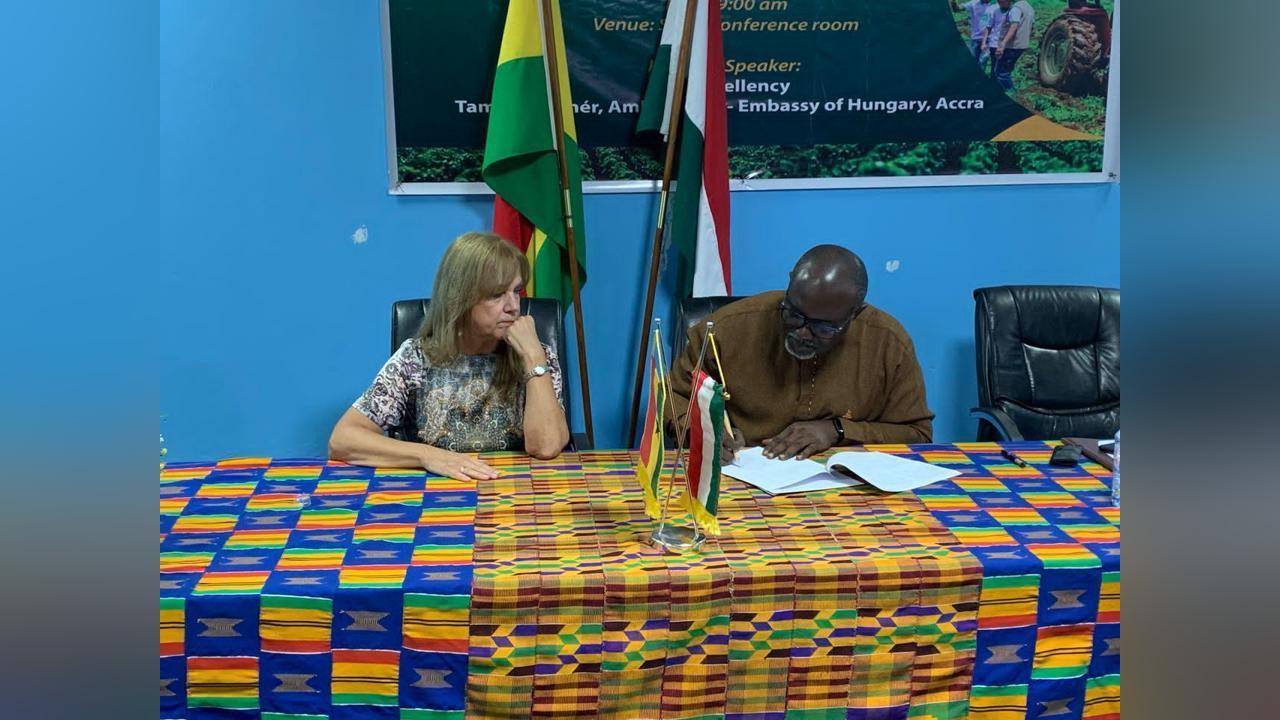Africa-Press – Ghana. The Biotechnology and Nuclear Agriculture Research Institute (BNARI) of the Ghana Atomic Energy Commission (GAEC) has partnered with Hungary’s Ministry of Agriculture to train Agricultural Extension officers to boost food security and promote sustainable farming practices.
The partnership is set to run from April to September 2025, beginning with a five-week pilot phase as a precursor to broader implementation.
The training programme also seeks to equip Agricultural Extension Officers (AEOs) with the knowledge, practical skills, and essential resources necessary to support farmers, improve agricultural practices and productivity, while ensuring sustainable farming in Ghana.
In a statement copied to the Ghana News Agency in Accra said Professor Michael Osae, Director of BNARI and the Food and Agriculture Organisation (FAO) Project Coordinator at Hungary’s MoFA, Ms. Gabriella Grüner, signed a Memorandum of Understanding (MoU) to ensure good commitments from both entities.
Speaking at the signing ceremony, Prof. Osae described the collaboration as a critical milestone in the transformation of Ghana’s agricultural extension services.
“This partnership marks the beginning of a vital learning journey aimed at strengthening the capacities of our Agricultural Extension Officers who are key to the transformation of Ghana’s agricultural sector,” he said.
He emphasized that extension officers played a pivotal role in linking research institutions, policymakers, and farmers, ensuring that innovations and best practices were effectively communicated and adopted at the grassroots level.
Prof. Osae said: “Their responsibilities go beyond providing advice, they empower farmers with the skills and knowledge to increase productivity, enhance food safety, adapt to climate change, and improve livelihoods,” adding that, “that is why this training is so important for Ghana’s agricultural development agenda.”
He further indicated that participants will be trained in several key areas, including extension methodology, agricultural knowledge and information systems, business planning, cooperative models for small-scale farmers, and postharvest management techniques.
The statement said, Ms. Grüner expressed optimism about the partnership and its potential long-term benefits, saying “we are proud to collaborate with Ghana through BNARI to share Hungary’s expertise in agricultural innovation.”
She said strengthening extension services was crucial to building resilient food systems, and expressed confidence that the programme would have a lasting impact.
Ms. Grüner also cited Hungary’s experience in Uganda, where a similar training model led to significant improvements in the country’s agricultural landscape.
She emphasized that Hungary remained committed to knowledge-sharing and collaborative development initiatives that drive economic growth.
She noted that Ghana was among 48 countries currently benefiting from Hungary’s scholarship programme, with over 400 Ghanaian citizens already taking part.
The statement said the signing ceremony was attended by officials from GAEC, the Hungarian Embassy in Accra, the Ministry of Food and Agriculture (MoFA) and other key stakeholders in the agricultural and scientific research sectors.
For More News And Analysis About Ghana Follow Africa-Press







